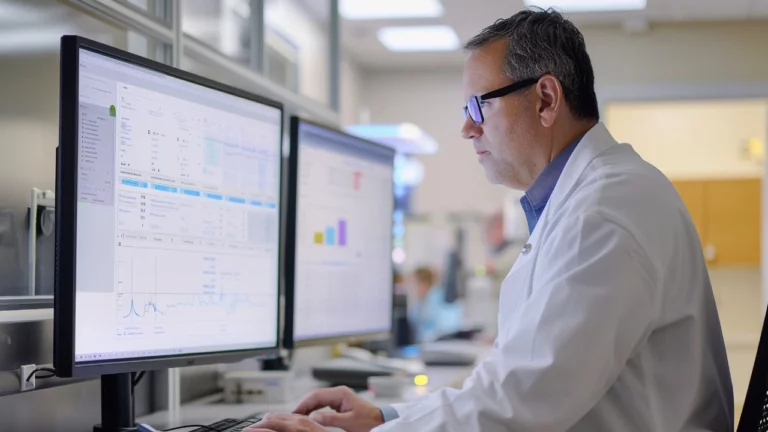Hypertension heart disease and stroke are serious health conditions that are closely related. Understanding the relationship between each of these conditions, and the risk factors associated with them, is essential for preventing and managing them effectively. In this article, we will explain how hypertension, heart disease, and stroke are related, and the importance of managing high blood pressure to prevent heart attack. We will also discuss the use of remote patient monitoring (RPM) in managing hypertension heart disease and stroke, and how it can improve patient outcomes.
What is Hypertension Heart Disease?
Hypertension heart disease, also known as hypertensive heart disease, is a serious condition caused by long-term high blood pressure. It can cause damage to the heart and blood vessels, leading to symptoms such as chest pain, shortness of breath, and fatigue. However, many people with hypertension may have no outward symptoms at all, making it a “silent killer.” Regularly checking your blood pressure and seeking medical attention if you notice any unusual symptoms is crucial in preventing the progression of hypertension heart disease. If diagnosed and treated early, hypertension heart disease can be managed with lifestyle changes and medication. But if left untreated, it can lead to serious health problems such as heart attack, stroke, and heart failure.
How Hypertension Heart Disease and Stroke are Related
The connection between hypertension heart disease and stroke is clear. Hypertension, or high blood pressure, can cause damage to the heart and blood vessels over time. When the heart must work harder to pump blood through narrowed or blocked blood vessels, it can lead to the thickening of the heart muscle, making it harder for the heart to pump blood effectively. This can increase the risk of heart disease and damage. Additionally, hypertension can also cause damage to the blood vessels, making them more prone to clogging and blocking, which can lead to stroke. The damage caused by hypertension can also increase the risk of stroke, as the narrowed or blocked blood vessels in the brain can lead to a lack of oxygen and nutrients, causing brain damage or death.
Can High Blood Pressure Cause a Heart Attack?
High blood pressure is a leading risk factor for heart attacks. When blood pressure is consistently high, it can cause damage to the blood vessels and the heart over time. This can lead to the formation of plaque in the coronary arteries, which can block the flow of blood to the heart. If a blockage becomes severe enough, it can cause a heart attack.
Hypertensive heart disease is a condition caused by chronic high blood pressure. It can cause the heart to work harder to pump blood, leading to thickening of the heart muscle and an increased risk of heart attack or heart failure. High blood pressure can also increase the risk of stroke, another serious condition caused by a lack of blood flow to the brain. Regularly checking your blood pressure and seeking medical attention if you notice any unusual symptoms is crucial in preventing the progression of HHD and reducing the risk of stroke or heart disease. By taking control of your blood pressure today, you can help prevent the onset of HHD and reduce your risk of heart attack and stroke.
Prevention and treatment
Managing high blood pressure is the most effective way to prevent hypertension heart disease or stroke. This can be achieved through a combination of both medication and lifestyle changes. Lifestyle modifications, such as eating a healthy diet, doing physical exercise on a constant basis, and maintaining a healthy weight, can help lower blood pressure naturally. Quitting smoking and limiting alcohol intake can also have a positive impact on blood pressure. Medications such as ACE inhibitors, diuretics, and beta-blockers can also be used to treat hypertension. It is essential to work with a healthcare provider to develop an individualized plan that includes both medication and lifestyle changes to effectively manage hypertension and prevent hypertension heart disease and stroke.
Managing Hypertension Heart disease and Stroke with DrKumo Remote Patient Monitoring
DrKumo is a leading provider of RPM solutions that utilizes cutting-edge technology to improve healthcare outcomes. DrKumo RPM solutions are compliant with HIPAA regulations and can be accessed via mobile devices. Our remote monitoring systems enable patients to gather and transmit health data, such as blood pressure levels, to their healthcare providers in real-time. This allows for more frequent monitoring and adjustments to treatment plans for patients with chronic conditions like hypertension heart disease. For example, a patient with hypertension can use a blood pressure monitor at home to regularly check their blood pressure and have the results automatically sent to their healthcare provider for their analysis and adjustments to the pateint’s treatment plan, as needed. This consistent provider/patient interaction helps to prevent complications and improve patient outcomes.
Conclusion
Hypertension heart disease and stroke are serious conditions that are closely linked. Managing high blood pressure is crucial to prevent these conditions. Lifestyle changes, medications, and regular monitoring of blood pressure are effective ways to prevent hypertension heart disease and stroke. It is essential for you to be aware of your risk factors and to have regular check-ups with your healthcare provider to monitor your cardiovascular health. By taking control of high blood pressure, you can significantly reduce your risk of developing heart disease and stroke.
Do not wait, take immediate action to manage your hypertension heart disease and stroke with the help of RPM. Contact DrKumo now to learn more about our RPM program and how it can empower you to proactively monitor your health and prevent further complications.








